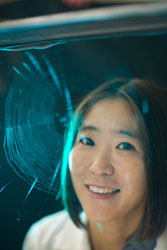Spider Silk Scientist Cheryl Hayashi to Kick Off MBL Friday Evening Lecture Series, June 19

Spiders are the superstars of the natural world when it comes to spinning silk. Spiders reign supreme in the diversity of silks they can spin and the extreme toughness of silk rivals some of the best manmade materials. Capable of remarkable feats, spiders and their web spinning abilities have been the inspiration for ancient legends, beloved children’s books, comics, and movies. But what is really known about spider silk?

Spider silk biologist Cheryl Hayashi will share results from the latest discoveries about the mysteries of silk synthesis, which spiders have held secret for several hundred million years, at the MBL (Marine Biological Laboratory) Friday Evening Lecture season opener on Friday, June 19. Her lecture, “The Science of Spider Silk: Amazing But True,” will be held at 8:00 PM in the MBL’s Lillie Auditorium, 7 MBL Street, Woods Hole. The event is free and open to the public.
Hayashi is a Professor of Biology at the University of California, Riverside where she serves as Vice-Chair for the Department of Biology and Graduate Advisor for the Joint Doctoral Program in Evolutionary Biology. She received her B.S., M.S., and Ph.D. in Biology from Yale University and was a postdoctoral Researcher at the University of Wyoming prior to joining UC Riverside in 2001.
Hayashi explores spider silk’s genetic makeup, evolution, and unique biomechanics in work that blurs the boundary between biology and materials science. In 2007, she was awarded a MacArthur Fellowship, commonly known as a ‘genius award,’ by the John D. and Catherine T. MacArthur Foundation. Her scientific articles have appeared in such journals as Science, Proceedings of the National Academy of Sciences, and the Journal of Experimental Biology. Hayashi’s research has also been featured widely in popular media including, The Los Angeles Times, The New York Times, Discover, Scientific American, NPR, BBC, and Discovery Channel. She currently serves on the editorial boards of Physiological and Biochemical Zoology and Zoology.
The Friday Evening Lecture Series will continue throughout the summer at the MBL. The remaining lectures in the series are below. For more information, visit mbl.edu/FEL
June 26
“How Parkinson’s Disease Starts – And How It Might Be Stopped” – Gregory Petsko, Weill Cornell Medical College
July 3
Segal Lecture - “Life Interrupted: Exploring the World of Extreme Adaptation” – Jonathan Gitlin, Marine Biological Laboratory
July 10
“The Invisible Influence of the Microbiome” – Jack Gilbert, University of Chicago
July 17
Forbes Lecture - “Electrical Signaling: Life in the Fast Lane“ – William Catterall, University of Washington
July 24
Porter Lecture – “Development of External Genitalia: From Evolutionary Origins to Congenital Malformations” – Martin Cohn, University of Florida; Howard Hughes Medical Institute
July 31
E.B. Wilson History and Philosophy of Science Lecture – “Why We Should Trust Science: Perspectives from the History and Philosophy of Science” – Naomi Oreskes, Harvard University
August 7
Director’s Lecture – “Microbial Dark Matter” – Edward Rubin, Department of Energy Joint Genome Institute
August 14
Glassman Lecture – “Ecology in a Human Biosphere” – Erle Ellis, University of Maryland, Baltimore County
—###—
The Marine Biological Laboratory (MBL) is dedicated to scientific discovery and improving the human condition through research and education in biology, biomedicine, and environmental science. Founded in Woods Hole, Massachusetts, in 1888, the MBL is a private, nonprofit institution and an affiliate of the University of Chicago.